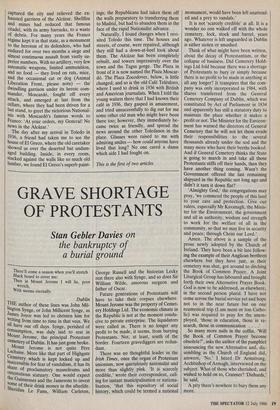GRAVE SHORTAGE OF PROTESTANTS
Stan Gebler Davies on
the bankruptcy of a burial ground
There'll come a season when you'll stretch Black board to cover me:
Then in Mount Jerome I will lie, poor wretch, With worms eternally.
Dublin THE author of these lines was John Mil- lington Synge, or John Millicent Synge, as James Joyce was led to christen him for Writing from time to time in that vein. We all have our off days. Synge, perished of consumption, was duly laid to rest in Mount Jerome, the principal Protestant Cemetery of Dublin. It has just gone broke. Mount Jerome is not quite Pere Lachaise. More like that part of Highgate Cemetery which is kept locked up and inaccessible for fear of vandalism, it has its share of proclamatory mausoleums and ostentatious statuary. One would expect the Guinnesses and the Jamesons to invest some of their drink money in the afterlife. Sheridan Le Fanu, William Carleton, George Russell and the historian Lecky rest there also with Synge, and so does Sir William Wilde, amorous surgeon and father of Oscar.
Future generations of Protestants will have to take their corpses elsewhere. Mount Jerome was the property of Cemet- ery Holdings Ltd. The economic climate in the Republic is not at the moment condu- cive to private enterprise. The liquidators were called in. There is no longer any profit to be made, it seems, from burying Protestants. Not, at least, south of the border. Fourteen gravediggers are redun- dant.
There was no thoughtful leader in the Irish Times, once the organ of Protestant unionism, now querulously nationalist and more than slightly pink. 'It is scarcely credible,' wrote their correspondent, call- ing for instant municipalisation or nationa- lisation, 'that this repository of social history, which could be termed a national momument, would have been left unattend- ed and a prey to vandals.'
It is not 'scarcely credible' at all. It is a wonder no one walked off with the whole cemetery, lock, stock and barrel, years ago. Whatever is left unguarded in Dublin is either stolen or smashed.
Think of what might have been written, about the decay of Protestantism, or the collapse of business. Did Cemetery Hold- ings Ltd fold because there was a shortage of Protestants to bury or simply because there is no profit to be made in anything at all any longer? It transpires that the com- pany was only incorporated in 1984, with shares transferred from the General Cemetery Company of Dublin, which was constituted by Act of Parliament in 1834 and apparently has still a statutory duty to maintain the place whether it makes a profit or not. The Minister for the Environ- ment has warned the directors of General Cemetery that he will not let them evade their responsibilities to the several thousands already under the sod and the many more who have their berths booked. And if General Cemetery thinks the State is going to march in and take all those Protestants stiffs off their hands, then they have another thing coming. Wasn't the Government offered the last remaining shipyard in the Republic not long ago and didn't it turn it down flat?
`Almighty God,' the congregations may pray, 'we commend the people of this land to your care and protection. Give our rulers, especially Mr Kavanagh, the Minis- ter for the Environment, the government and all in authority, wisdom and strength to work for the welfare of all in the community, so that we may live in security and peace; through Christ our Lord.'
Amen. The above is a sample of the prose newly adopted by the Church of Ireland. They have been a bit late follow- ing the example of their Anglican brethren elsewhere but they have just, as their cemetery was shut, got around to ditching the Book of Common Prayer. A Joint Liturgical Group has laboured and brought forth their own Alternative Prayer Book. God is now to be addressed, as elsewhere, in the second person plural. I have not come across the burial service yet and hope not to in the near future but on one ecumenical trip (I am more or less Catho- lic) was required to pray for the unem- ployed, 'those in education, those in re- search, those in communication . .
So many more nails in the coffin. 'Will the Book of Common Prayer become obsolete?', asks the author of the pamphlet announcing the new Alternative and, dis- sembling as the Church of England did, answers, 'No.' I heard Dr Armstrong, Archbishop of Armagh, interviewed on the subject. What of those who cherished, and wished to hold on to, Cramer? 'Diehards,' he said.
A pity there's nowhere to bury them any more.


















































 Previous page
Previous page